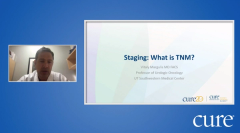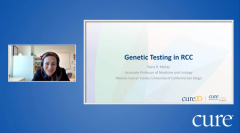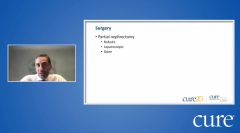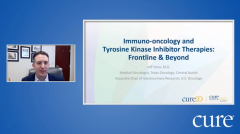
Educated Patient® Kidney Cancer Summit Genetic Testing in RCC Presentation: April 9, 2022
Watch Dr. Rana R. McKay, from the University of California San Diego, discuss genetic testing in renal cell carcinoma during the CURE Educated Patient Kidney Cancer Summit.
Episodes in this series

Although rare, inherited renal cell carcinoma (RCC) is important for patients to understand as genetic testing result could determine treatment options in the future, according to Dr. Rana R. McKay.
At the CURE® Educated Patient® Kidney Cancer Summit, held virtually on April 9, McKay, associate professor of medicine and urology at Moores Cancer Center at the University of California San Diego, offered an overview of RCC types and causes, genes and genetic testing, and precision medicine for the disease.
“Inherited RCC is rare, and there are specific guidelines for genetic testing to evaluate for inherited RCC. Most cases of RCC are sporadic and genetic testing can be considered in specific cases to inform prognosis and therapy selection,” she said. “And the field is moving towards precision medicine platforms and next generation clinical trials that will evaluate biomarker-based strategies for therapy selection.”
RCC Subtypes and Causes
“RCC is really not just one disease. It is a cluster of different kinds of diseases that have a different reason for why they developed,” McKay said.
In particular, RCC is broken into two subtypes: clear cell, which accounts for 75% of the disease, and non-clear cell, accounting for 25%. Although rarer, non-clear cell RCC is broken out even further into papillary type 1 and 2, chromophobe, translocation, collecting duct or unclassified subtypes. Meanwhile, sarcomatoid differentiation can can be present across all the different kinds of histologies of RCC, McKay said. “About 20% of patients who have advanced stage disease will have sarcomatoid differentiation in their tumor,” she added.
RCC most often occurs as a sporadic cancer, caused by risk factors such as smoking, hypertension, obesity, chronic kidney disease or occupational exposures. However, RCC can also be a hereditary cancer, meaning there are inherited gene mutations which can be passed on from a parent to a child.
Genetics in RCC
What makes RCC a genetic disease is an alteration that may develop within a normal kidney cell that affects how the cell grows and divides into new cells. The main difference between inherited, or germline, mutations and acquired, or somatic, mutations, is that the first is present in normal DNA and the latter is present in tumor DNA. This means that inherited mutations, which only account for 5% of RCCs, are present in an egg or sperm, causing a family syndrome to be passed on from a parent to their child. On the other hand, somatic mutations occur in non-germline tissue, and are only present in the tumor.
In clear cell RCC, the most common inherited alteration is von-Hippel Lindau, or VHL, disease.
Genetic Testing: Germine vs Somatic
Genetic testing in the germline includes blood or saliva tests, while somatic genetic testing Is comprised of testing tumor tissue or blood, in particular circulating tumor DNA.
People with a close relative with a known mutation in a cancer susceptibility gene, those diagnosed with RCC before the age of 46, those with bilateral or multifocal tumors, with one or more first- or second-degree relatives with RCC, and those with tumors that have features of hereditary RCC should consider getting germline testing, McKay said. As a result of genetic testing, patients may be able to inform of cascade testing for family members, they can inform other multidisciplinary strategies in their care, and they can inform targeted therapy options – like treatment with Welireg (belzutifan) for those with VHL disease.
McKay noted that somatic, or tumor, testing can be considered in patients with non-clear cell RCC, and also in patients who are refractory to treatment to help guide their eligibility for a clinical trial. In particular, she added, this can inform a prognosis and targeted therapy strategies for patients. “It's not necessarily indicated in the guidelines for somatic tumor profiling for patients with RCC, but there are scenarios that I do integrate that into my clinical practice.”
For more news on cancer updates, research and education, don’t forget to















